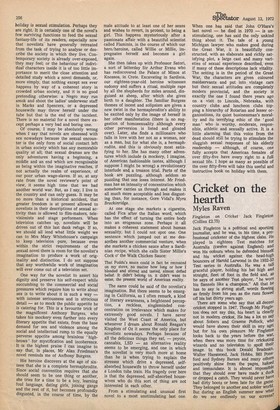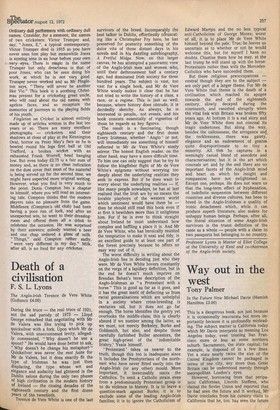Cricket on the hearth
Myles Raven
Fingleton on Cricket Jack Fingleton (Collins £2.75) Jack Fingleton is a political and sporting journalist, and he was, in his time, a professionitl cricketer of the highest class. He played in eighteen Test matches for Australia (twelve against England) and won his colours When he defended himself and 'his Wicket against the head-high bouncers of Harold Larwood in the 1932-33 Test series in Australia. He was a tall graceful player, holding his bat high and straight, .fleet of foot in the field and, as 'he says of another Test player, "he wore his flannels like a champion." All that he has to say is strong stuff, iwords flowing as firmly from his pen as the runs flowed off his bat thirty years ago. There are some who say that all decent cricket stopped in 1947. Though Mr Fingleton does not say this, his heart is clearlY not in modern cricket. He has a lot to saY about Sobers and Graeme P011ock, who would have shown their skill in any age; but for his own pleasure Mr Fingleton looks back to the years before the War, vvhen there was more time for cricketing wizards and no television to spoil their image. In this book Donald Bradman, Walter Hammond, Jack Hobbs, Bill ponsford and Sydney Barnes and many others„ positively shine from the pages, haloeu and immaculate. It is almost impossible that they should ever have made a digit or dropped a catch. They would never have had dirty boots or been late for the garne. They belonged to another and nobler world. But during an English summer now what_ do we see endlessly on our screens? Ordinary dull performers with ordinary dull names. Consider, for a moment, the names of two cricketers: Victor Trumper and, say, "Jones, E.", a typical contemporary. Victor Trumper died in 1915 so you have never seen him play but meanwhile Jones is scoring nine in an hour before your own n very eyes. There is magic in the name Trumper but only dreariness in that of poor Jones, who can be seen doing his work, at which he is not very good. Trumper never 'worked and as Mr Fingleton says, "There will never be another like Vic." This book is a soothing Christmas present for a cricketing great uncle, who will read about the old names with ageless faces, and so recapture the memories of journeys to the playing fields of his youth.
Fingleton an Cricket is almost entirely made up of articles written in the last ten years or so. There are many excellent photographs — cricketers and their shadows at close of play at the Kennington Oval, horror on Peter May's face as he is bowled round his legs first ball at Old Trafford, a broken wicket with an exhausted Frank Worrell, head hanging low. But even today £2.75 is a fair sum of money and, as there is no clear indication on the dust cover that most of the material is being served up for the second time, we might have expected more original writing. However, what you find is very much to the point. Denis Compton has a chapter to himself, where you will read an interesting tale. Compton thinks that the modern players take no pleasure from the game. Middlesex (Compton's old club) had been having a poor run of luck, and after an unexpected win, he went to their dressingroom and offered them all a chink to celebrate the occasion. He was surprised by their answers; nobody wanted a beer and one chap ordered a glass of milk. "Things," said Compton rather sadly, "were very different in my day." Milk, after all, is no food for any cricketer.



























 Previous page
Previous page